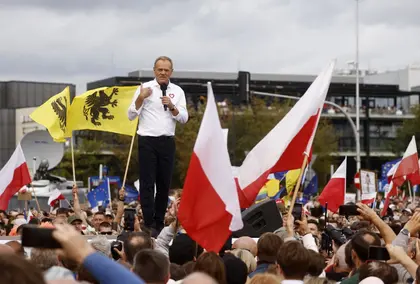Poland holds elections this week that experts say are set to be won by the governing populists, putting the country on a collision course with Ukraine and the European Union.
The latest polls show the Law and Justice (PiS) party at 32 to 34 percent, a few points ahead of the Civic Coalition (KO) led by former EU chief Donald Tusk.
JOIN US ON TELEGRAM
Follow our coverage of the war on the @Kyivpost_official.
But the ultimate result is likely to hinge on which of the two can build a governing coalition.
The election “is extremely close fought and evenly balanced”, Aleks Szczerbiak, a politics professor at the University of Sussex, wrote in a blog.
Dorota Dakowska, a politics professor at Sciences Po Aix in southern France, said it was “the most important election” since the first vote of the post-communist period in 1989.
“What is at play is the future of democracy in Poland and the future of Poland as a democracy and a country of rule of law,” she said.
While Law and Justice is set to get the most votes in the parliamentary elections for the third time in a row, it appears set to fall short of a majority.
The most obvious partner is the far-right Confederation party, which wants Poland to stop aid to Ukraine and has criticised the rights of Ukrainian refugees.
But the opposition’s ratings have been going up in the most recent polls and a coalition of three opposition parties may have more chance of forming a government.

Moldova Residents Caught in the Middle of Gas Fight
Even if they do so, however, they could face hostility from government ally President Andrzej Duda and are unlikely to garner the 60 percent majority of seats required in parliament to overturn presidential vetos.
- ‘Return back to normal’ -
Tusk managed to bring together hundreds of thousands of people in the streets of Warsaw this month in an unprecedented show of force by government opponents.
But he has concentrated his campaign in rural areas and small towns where support for the ruling party is still strong, focusing on the state of the economy.
Inflation has remained relatively high in Poland and is forecast by the EU to reach 11.4 percent in 2023, while growth is set to remain sluggish at 0.5 percent.
The governing party has focused on national security and sovereignty and has launched highly personal attacks on Tusk himself, accusing him of being unpatriotic and working in the interests of Russia and Germany.
PiS leader Jaroslaw Kaczynski, Poland’s true power broker, has called Tusk the “personification of pure evil” and accused him of “national treason”.
State media and the network of regional media owned by state energy giant Orlen have amplified these attacks.
The language has concerned many Poles.
“It’s high time that we return back to normal, to the rule of law, to freedom of choice and of speech,” Monika Pieleszynska, a 43-year-old clerk, said at the massive opposition rally on October 1.
The OSCE’s Office for Democratic Institutions and Human Rights, which is observing the elections, noted “a highly polarised environment” in a report last month.
It said many of its interlocutors had indicated “a perceived marked bias in favour of the ruling party and its policies in public media”.
- ‘Purely electoral move’ -
In terms of foreign policy, another victory for PiS could aggravate tensions and make Poland an even more awkward partner within the European Union.
The current government has been at loggerheads with Brussels for years, mainly over judicial reforms seen as undermining democracy and the rule of law but also over restrictions on media freedoms and migrant rights.
Now, relations with Ukraine are also brittle even though Poland has up to now been a leading supporter of Kyiv following Russia’s invasion on February 24, 2022.
Poland has taken in over one million Ukrainian refugees, sent large amounts of weapons and aid and acted as a key transit country for Western supplies.
But Poland’s decision to stop Ukrainian grain imports earlier this year to protect its own farmers angered Kyiv, and in a subsequent high-profile diplomatic spat Warsaw also threatened to restrict arms supplies.
President Duda compared Ukraine to a “drowning man” who could pull his rescuers into the water.
The rhetoric is likely aimed at winning nationalist votes but also reflects “war fatigue” among Poles.
A recent poll by the IBRiS Foundation found that around 40 percent of Poles were opposed to extending a government provision allowing Ukrainians access to the labour market, healthcare, education and social benefits.
Boguslaw Chrabota, a commentator for the Rzeczpospolita newspaper, called the recent diplomatic tensions with Ukraine “short-sighted” but said they were “a purely electoral move” that would be only “temporary”.
You can also highlight the text and press Ctrl + Enter










